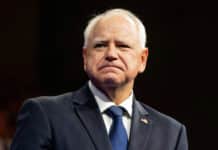
The Minnesota Chamber of Commerce has filed a lawsuit in federal district court challenging a provision contained in a sweeping new elections reform law it says unconstitutionally restricts the political speech of its members’ businesses who have minimal investment from foreign-based individuals and entities.
The challenge comes months after Republicans in the House warned DFL legislators sponsoring the bill this spring that the provision violates case law surrounding political speech of corporations.
The Chamber filed the lawsuit in federal district court on June 30 and names the Minnesota Campaign Finance and Public Disclosure Board and Ramsey County Attorney John Choi as defendants. Choi was named as a defendant because, as top prosecutor in the Minnesota legislature’s home county, he is responsible for enforcing state law.
The lawsuit challenges a provision contained within HF3 — which DFL sponsors coined the “Democracy for the People Act” — that effectively prohibits companies that have even minimal investment from foreign-based individuals or entities from making political contributions in Minnesota. The DFL-controlled legislature passed the legislation in April and Gov. Tim Walz signed it into law in May.
The Chamber states in the complaint that its “members presently fear criminal prosecution for violations of the statutory prohibitions at issue, which results in members avoiding making certain speech, and thereby chilling their speech.”
“We strongly believe this law is an unconstitutional impingement on the free speech rights of members of the Minnesota business community,” said Doug Loon, president and CEO of the Chamber, in a statement to Alpha News. “We look forward to restoring their ability — as ‘people’ in the eyes of the law — to participate in the democratic process.”
The chamber filed the lawsuit on behalf of its members, which amounts to about 6,300 businesses that employ more than a half million people across Minnesota.
While state and federal law already prohibit foreign individuals from contributing to political campaigns, the new provision that went into effect June 1 goes much further: it bars businesses from donating to elections if even 1 percent of its ownership is tied to a single foreign investor or if 5 percent of its ownership is tied to two or more foreign investors in aggregate.
“The Chamber brings this civil action for declaratory and injunctive relief on behalf of itself and its members because, while these types of activities are speech protected by the First Amendment to the United States Constitution, as recognized by the United States Supreme Court in Citizens United v. Federal Election Commission, Minnesota has recently enacted legislation that unconstitutionally restricts and prohibits speech by corporations and limited liability companies who the legislature has defined as ‘foreign influenced corporations,’” according to the complaint, written and signed by a team of attorneys with Minneapolis-based Winthrop & Weinstine, the law firm representing the Chamber in the case.
“These statutory amendments and corresponding provisions of Minnesota Statute § 211B unconstitutionally prohibit and threaten prosecution of independent corporate political and free speech activities that the United States Supreme Court has held are protected by the First Amendment to the United States Constitution,” the complaint continues.
The Office of Attorney General, which is tasked with defending state laws in court, didn’t return a request for comment by the time of publication.
Republican legislators warned provision likely to face legal challenge
In April, Republicans who voted against the overall legislation argued the provision governing corporate political speech intently did not include the same restrictions on foreign-influenced nonprofit organizations. One such organization is the Center for American Progress, which actually crafted model legislation that mirrors the provision outlined in the lawsuit. The Center for American Progress actually submitted written testimony in support of the provision when it was heard in a Minnesota House Elections Committee in January.
“This legislation is literally — by its own term — foreign-influenced legislation,” said Rep. Harry Niska, R-Ramsey, an attorney who specializes in constitutional litigation. “It’s like the snake eating its own tail … while [this provision] chooses to disable for-profit corporations, it chooses not to regulate certain other entities.”
For that reason, Niska offered an amendment during House floor debate on the bill that would have expanded language in the provision to include nonprofit entities, such as political advocacy organizations and even international labor unions, that receive money from foreign donors.
While Niska’s floor amendment ultimately failed on a party-line vote, the author of the provision, Rep. Zack Stephenson, DFL-Coon Rapids, admitted it had some merit.
“I am interested in looking into the idea of looking at not-for-profit corporations that are foreign influenced and labor unions and any other group,” Stephenson said. “It’s an interesting discussion … but it wasn’t the problem I was trying to solve when I authored this bill.”
Not the first time MN Chamber has sued over corporate political speech
It’s not the first time the Minnesota Chamber of Commerce has filed a lawsuit over corporate political speech.
In 2010 the organization sued then-Ramsey County Attorney Susan Gaertner seeking a declaratory judgment on how election contribution statutes in Minnesota would be impacted by the recent U.S. Supreme Court’s Citizens United ruling, in an effort to clarify what corporations can do to influence elections in Minnesota. The Chamber sued to assert its free speech rights following a U.S. Supreme Court decision in January of that year that struck down similar restrictions on the federal level.
A federal judge in that case ruled in favor of the Chamber in May 2010, declaring that Minnesota’s restrictions on independent expenditures by corporations on behalf of political candidates are unconstitutional. While the Chamber was not seeking the right to make direct contributions to candidates, it argued in the lawsuit that it wanted freedom to advertise and otherwise campaign on behalf of candidates it supports.
Hank Long
Hank Long is a journalism and communications professional whose writing career includes coverage of the Minnesota legislature, city and county governments and the commercial real estate industry. Hank received his undergraduate degree at the University of Minnesota, where he studied journalism, and his law degree at the University of St. Thomas. The Minnesota native lives in the Twin Cities with his wife and four children. His dream is to be around when the Vikings win the Super Bowl.
















